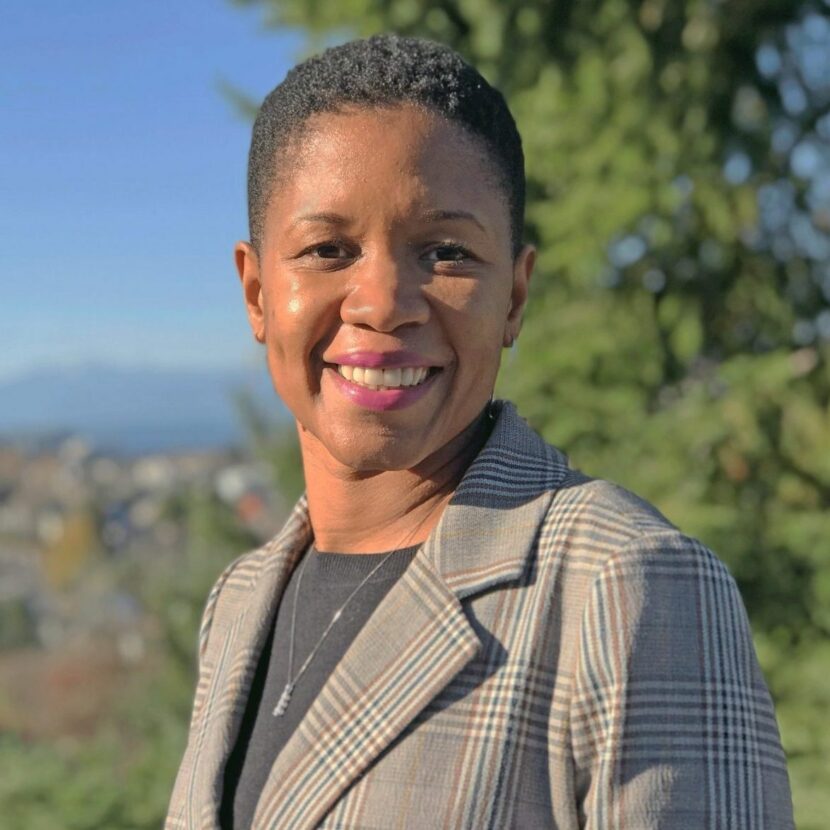Juneteenth: A Letter from Javania Polenska

By Javania Polenska, Deputy Director & Interim Executive Director
Juneteenth is an opportunity to celebrate Black freedom and liberation from slavery, commemorating when news arrived in Galveston, Texas, that the Civil War was over and enslaved people were free. For an organization dedicated to helping students overcome systemic barriers to access higher education, this holiday prompts reflection on how the roots of slavery still bind us.
Here in Washington, like the rest of America, our systems keep Black and communities of color stuck in cycles of poverty and injustice. Our systems are rigged to benefit the white and affluent.
It doesn’t have to be that way. We can change these systems. But my lived experience as a black woman who grew up in poverty has shown me that the change we seek is slow. So, while we actively work to dismantle systems that only work for some, we must give our kids the knowledge and resources they need to play the long game. Black and brown people need access to the type of education and financial support that gets us out of poverty and into spaces that need our fresh perspectives and new ideas. I am living proof of what can be done when we pour into our black and brown kids, and I am not the only one. So I am honored that I get to do the work I do every day. Work that focused on closing the opportunity gap, enabling us to create a more just Washington and America for all people.
We support low- and middle-income Washington students. Most are first-generation and students of color. We see the barriers to opportunity in the high-demand trade, STEM, and health care fields stacked highest for our Black and brown students.
Most jobs that pay a family-sustaining wage in our state require post-high school education. Yet less than half (41%) of Washington’s high school class of 2017 is expected to earn a credential by age 26, according to the Washington Roundtable. Less than a third of Black graduates (31%) are expected to reach that milestone.
Many of the jobs paying the highest salaries require a STEM or health care credential, but most students on pathways to those careers are not Black. Out of the 1,883 computer science degrees awarded in Washington during the 2018-19 school year, less than 4% were awarded to African American students, just under 6% to Hispanic students, and less than 1% to Native American students. From 2001 to 2016, the number of bachelor’s degrees in engineering awarded to Black graduates dropped from 5 to 4% and 7 to 4% in math.
The field of health care is no different. The percentage of Black male medical students has declined from 3.1% in 1978 to 2.9% in 2019. Black people comprise about 13% of the US population; less than 5% of licensed pharmacists and 4% of dentists are Black.
Left unaided, our higher education system leaves Black students out of opportunity and credentials. WSOS is changing that.
Roughly 4% of the Washington high school class of 2022 was Black, but 11% of our bachelor’s degree scholarship recipients were Black or African American that same year. In our most recent cohort of Career & Technical Scholarship (CTS) recipients, Black students comprise 15%, and we’ve doubled the number of Black students we support each year since the program’s inception. Additionally, our nurse practitioner program is diversifying the medical field, as more than half (53%) of the recipients selected for the 2022-23 academic year identify as students of color.
Our program is breaking cyclical poverty. The average wage of our bachelor’s degree graduates working full-time is $94,500, more than double the average household income of those Scholars’ entire families when they entered college. Wage gaps among our graduates disappear across race, ethnicity, gender, first-generation status, income, and rural/non-rural lines. Within nine months of our CTS graduates completing their credentials, their household income increased 2.5 times, from roughly $21,000 to $56,000.
WSOS is a proven model to undo historic injustices and provide opportunity, but we shouldn’t need to exist. All of us should have access to equitable pathways that lead to family-sustaining wages and opportunities. WSOS can only support a fraction of deserving Black students, and too many slip through the cracks of our program or never make it to our application or campus in the first place.
Increasing access to higher education benefits us all because diversity is a strength.
And we want your help. We need more partners in Black and Brown communities who can share our application with those who trust in them. We invite leaders in these communities to let us connect you to the Black Scholars who can share their stories with other students so they can see someone who looks like them becoming a computer scientist, a doctor, an engineer, or a welder.
On this Juneteenth, we challenge ourselves and our partners to continue dismantling these barriers on behalf of our Scholars so that future Black and Brown Washington students are born with the opportunity to thrive and succeed in our state. You can help us build a more just and equitable Washington by getting involved.
